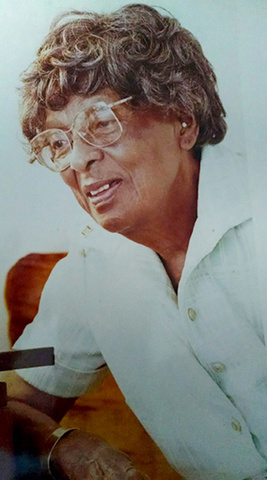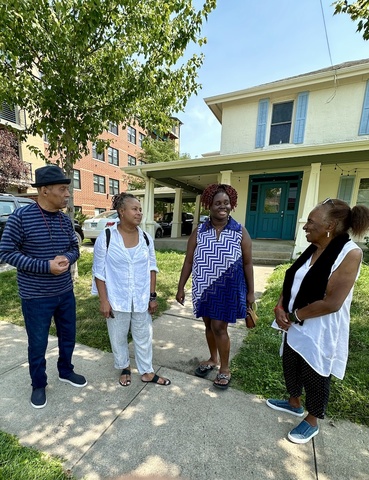A partnership between Johnson County and the University of Iowa’s College of Liberal Arts and Sciences (CLAS) is shedding new light on local history — and playing a key role in the endeavor is an MFA student who came to Iowa from Nigeria to hone her writing skills and gained valuable professional experience in the process.
Changing the eponym of Johnson County, Iowa
The project dates to the summer of 2020, when the Johnson County Board of Supervisors received several requests to rename the county, which was originally named for Richard Mentor Johnson, a historical figure whose legacy many felt no longer reflected the values of the community. Seeking to rectify this, the board sought alternatives for who could better represent the county's ethos.

Enter Lulu (pronounced Lu-la) Merle Johnson. The first African American woman to receive a PhD from the University of Iowa, her doctoral dissertation focused on slavery in the Northwest Territory, a pioneering work at a time when few delved into this topic. Recognizing her exceptional contribution to academia and her connection to Johnson County, the board changed the county's official eponym to Dr. Lulu Merle Johnson in June 2021.
This change was more than symbolic; the board decided to commemorate this historic moment and create an educational opportunity for the community. That vision included an interpretive exhibit celebrating Johnson's legacy and offering insights into Iowa City's African American community during segregation.
An opportunity for community collaboration
Allison Wells, grants manager with Johnson County and an Iowa PhD graduate of history, issued the call for proposals to develop an exhibit that would pay homage to Johnson's achievements and shed light on Iowa City's African American history during segregation.
Dr. Rebecca Conard, an expert in public history, saw a great opportunity.
"When I read the request for proposals, I thought this seemed like such a perfect project for bringing on a graduate student assistant, not to be a gopher, but to be part of the project and really learn what public history is and how you approach it,” Conard says.
Conard’s proposal received enthusiastic support in part for the idea of a competitive research assistantship in CLAS, funded by the county, that would employ a graduate student on the project.
"I was very, very excited about the project and that piece of it. Having come from the university setting and now working at Johnson County, there's just so much room for collaboration between our two entities,” Wells explains
The position was advertised on campus and caught the eye of Mofiyinfoluwa Okupe, a graduate student in Iowa’s Nonfiction Writing Program and native of Nigeria. Mofiyinfoluwa, who goes by Fi, felt an immediate connection to the project, having already embarked on her own journey of documenting contemporary Nigerian culture and her family history, and her application letter conveyed this.

“Dr. Lulu Merle Johnson being the first African American woman to obtain a PhD from Iowa is critical history that should be preserved and published, both as testament to the momentous work of the past and as inspiration for the pressing work of the future,” she wrote.
Combining research and narrative
To Fi, this was not just a project but a duty, and the prospect of exploring Johnson's journey clearly spoke to her.
The committee was convinced and selected Fi, who brought her unique blend of academic, professional, and creative storytelling skills to the project. Her responsibilities included conducting oral history interviews, working with university archives, transcribing recordings, and engaging with Johnson County administration staff.

Fi's journey of discovery also took her to historic Cheyney University in Pennsylvania, where she delved into Dr. Johnson's legacy during her tenure as Dean of Women and head of the social studies department. Fi’s time at Cheyney was a revelation.
"I was able to see her animated, able to see her move, and find out so much of her values through the archive," she recalled.
Fi’s quest also extended to meeting Dr. Johnson's living descendants in Des Moines. Their collaboration provided valuable insights and helped breathe life into Dr. Johnson's story.
The project is still underway, and the team is in the early stages of designing an outdoor exhibit, possibly including a statue, on the grounds of the Johnson County Administration building, with a goal to complete the exhibit by 2025.
Valuable career preparation
While the initiative reflects the college’s commitment to diversifying graduate education and providing graduate opportunities for community engagement, it also reflects the priority Iowa places on writing and communication as valuable skills with broad application, according to Christine Getz, associate dean for graduate education and outreach and engagement in the College of Liberal Arts and Sciences
“When you’re working with public history, one of the skills that’s required is the ability to communicate to the public at large. When I wrote the call for applications, I was envisioning historians. What emerged was a nonfiction writer, but I should not have been surprised…the fact is that our nonfiction students prepare for their writing projects through the kinds of historical research that other humanists do,” Getz says
For Fi, the experience was eye-opening.
"Working this assistantship made it clear to me that I have the skillset to potentially build a career in this form of historical, personal narrative preservation, something that I'd never thought of as a job before," she reflected. "Finding out that Rebecca works with things like historical consultancy, those were not things I'd ever heard of before or ever knew as job opportunities. It definitely widened my experience of what is possible if storytelling is a skill that you possess."
Residents of Johnson County can stay tuned for more progress on this exhibit as the plan takes shape in the coming year.